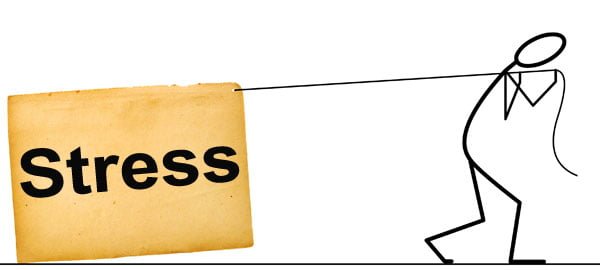How are you feeling today: Relaxed? Exhausted? Overwhelmed?
More than 1 in 4 working Canadian adults describes their days as “quite” or “extremely stressful”, a worrying statistic when long-term stress is linked to everything from diabetes and heart attacks to overeating, anxiety and depression.
What’s stressing you out
According to Statistics Canada, work is by far the most significant source of stress. However, 4 in 10 of the highly stressed say something other than work is their main issue; financial concerns, lack of time, family matters and other personal issues also drain us of our energy.
Different people are stressed out by different things; you may feel anxious about an upcoming performance review while your coworker is completely absorbed by an argument she had with her kids over dinner last night.
To identify the things that specifically cause you stress, the Mayo Clinic suggests keeping a stress inventory for one week: “Write down the situations, events and people who cause you to have a negative physical, mental or emotional response. Give a brief description of the situation.”
After a week, review your list and identify the specific problems. Then, look for ways to manage or eliminate those sources of distress.
Learn to cope and take control
The Canadian Mental Health Association recommends finding balance in your life to keep your stress levels in check. For most of us, that’s easier said than done, and what works for one person may not make a difference for someone else.
The best approach is to test different approaches and hold on to the strategies that work while dropping the ones that don’t. Here are a few suggestions:
- Take care of your physical and mental health. People who describe their physical or mental health as “very good” or “excellent” were less likely to feel high levels of stress. Other studies have shown that exercise, particularly aerobic exercise like running, can also help people cope.
- Take control. You can’t control everything, but owning the choices you do have can help reduce anxiety because you’re not just leaving things to chance. “The act of taking control is in itself empowering,” writes the UK’s National Health Services. “It’s a crucial part of finding a solution that satisfies you and not someone else.”
- Make time for yourself. Whether a trip to the gym, a bit of scrapbooking or just enjoying a cup of tea, regularly carving time for yourself can help you become more resilient. This helps bring “balance to your life by allowing you to do something you enjoy because you want to do it, free of the pressure of everyday tasks,” according to the CMHA.
- Choose your attitude. Dwelling on the negative is a sure way to increase stress levels. If you’re feeling overwhelmed, for example, focus on what you’ve accomplished by crossing things off a To Do list. Bring your attention to the positive by consciously writing a list of things you’re grateful for, or noting times when you feel happy or confident.
- Get a different point of view. Discussing an issue with a colleague or family member will bring you a different option and maybe even new solutions. Plus “just having someone to talk to can be a relief,” notes the Mayo Clinic.
- Try different strategies. Volunteering can be a great way to give back while socializing and taking a break from your normal routine. A study at Stanford, focused on children, found that meditation may help with multitasking. You may be able to better-manage your workload by finding ways to stop procrastinating, or by delegating tasks to other people. Allow yourself to experiment with stress management techniques so you can find what works best for you.
More Information about Reducing Stress at Home and Work
To learn more about stress management, check out some of the excellent references noted above:
- Coping With Stress, from Health Canada
- Ten Stress Busters, from National Health Services
- Tips For Coping With Stress At Work, from the Mayo Clinic
- Mental Health For All [PDF], from the Canadian Mental Health Association
If you feel like you’re under constant stress, or you need help getting things under control, please give us a call at 613-962-1042.

